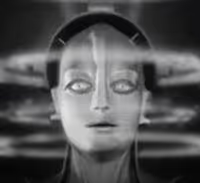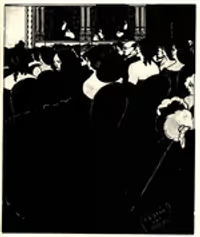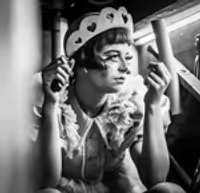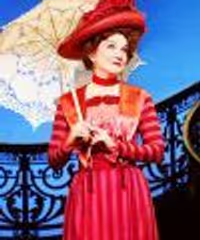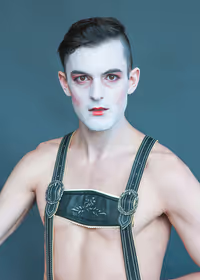West End CABARET Revival (and B’way Transfer?) - News & Discussion Thread
#225West End CABARET Eyeing Broadway Transfer to the Hudson?
Posted: 12/12/22 at 10:46am
I wouldn’t be surprised if it was intended to be a surprise drop of an album and those links and our discussion caught attention… never underestimate who may be reading the boards.
#226West End CABARET Eyeing Broadway Transfer to the Hudson?
Posted: 12/12/22 at 1:42pm
jacobsnchz14 said: "I wouldn’t be surprised if it was intended to be a surprise drop of an album and those links and our discussion caught attention… never underestimate who may be reading the boards."
Could be. It's odd not to see any press or pre-order links for a forthcoming cast album. I guess we'll see what happens? Worth noting that those links were for a physical CD with no mention of a digital release.
#227West End CABARET Eyeing Broadway Transfer to the Hudson?
Posted: 12/12/22 at 1:48pm
CATSNYrevival said: "jacobsnchz14 said: "I wouldn’t be surprised if it was intended to be a surprise drop of an album and those links and our discussion caught attention… never underestimate who may be reading the boards."
Could be. It's odd not to see any press or pre-order links for a forthcoming cast album. I guess we'll see what happens? Worth noting that those links were for a physical CD with no mention of a digital release."
A secret/surprise release would also be very on-brand for this particular production. At least for we have confirmation a release is SOON(ish)!
yahyahyah
Chorus Member Joined: 11/15/12
#228West End CABARET Eyeing Broadway Transfer to the Hudson?
Posted: 12/12/22 at 4:46pm
For what it’s worth, I saw this West End revival mid-October, and the pre-show was fully in place.
In fact, there was a replacement pre-show cast member seated next to me in the audience, who was just about to start performances. The whole pre-show cast was being refreshed at the year mark. So, perhaps it didn’t happen on your night due to an unforeseen event? Illness amongst that separate pre-show cast, etc?
I thought this production had some beautiful artistic choices, and production value. I thought Callum Scott Howells was fantastic as the Emcee. I was not enamored with the other principals. Madeline was maybe in her 2nd or 3rd week— I could see her growing into the role more.
Overall, despite the beautiful production design, I do not think it was more effective than the Mendes revival. It was less so for me. Often the book scenes seemed shapeless and the actors left at sea. Some of the principals seemed to be pushing hard, and perhaps lacked some life experience to ground the gravity of this story. A young cast, which is lovely to see, but perhaps that is the trade off.
#229West End CABARET Eyeing Broadway Transfer to the Hudson?
Posted: 12/12/22 at 5:52pm
Thanks for the interesting insight, yahyahyah. Yeah, from the couple friends I have who've seen the show, I've heard a similar sentiment: it's well done, but probably won't end up being a "defining" production of the show in the way that the original or the Mendes production were. Which is sort of what I was getting at in my earlier comments. All the prestige and secrecy around this production seem to indicate that it's some paradigm-shifting reinterpretation, which is not the sense I've gotten when I've actually talked to people about the production.
I also would be genuinely interested in hearing more about the interpretation of the Emcee! I've heard they basically try to reframe him as a twist villain who was actually fascist all along. While the Joel Grey Emcee is certainly sinister, he seems like more a representation of apathy than overt fascism. He doesn't take the Nazis seriously, and is happy to continue appealing to them as they make up a larger and larger portion of the Klub's audience. Cumming's Emcee is similar, but I would argue more sympathetic: he seems to be playing along at a certain point just to prevent himself from becoming the next target, and he ultimately *does* become the target in the end. In both cases, I don't get the sense that the character has any societal power, and he's trying to hold on to the little sphere of power he does have as long as possible.
For a character who has always been coded queer, and who the Mendes production explicitly reveals to be Jewish, it almost feels (forgive the hyperbole) disrespectful for a production to entirely erase that and dress him up in a blond wig and suit at the end like some Aryan poster boy just for a twist. Ernst is already the twist villain. The gut punch from the end of "If You Could See Her" is already there. Just making the Emcee a blatant villain seems like the most surface-level read of the character, and also removes the charisma and/or sympathy that makes the Emcee an effective audience guide and an appealing way in to the world of the show.
DISCLAIMER: My info is from speaking to friends, reading reviews, and listening to some audio from the production, and I'd genuinely like to know if what I've heard is way off-base, because it definitely could be.
lopside
Stand-by Joined: 11/16/21
#230West End CABARET Eyeing Broadway Transfer to the Hudson?
Posted: 12/12/22 at 10:44pm
You are making some very broad assumptions here.
There are some notable artists of whom I mention two, because I felt the production makes references to them. One is von Karajan, the conductor, a card-carrying member of the Nazi party, who was simply absolved as a Mitläufer ( read : not convinced by the ideology of the group followed but merely offers no resistance, such as for lack of courage or for opportunism) during denazification tribunals. He used to conduct concerts for Nazi meetings. Then there's Mary Wigman, whose expressionist dancing plays out in the production, and particularly in some of the ways Redmayne had crafted his physicality and movement. Her work fell under "degenerate" art of course, a complete no-no, but she followed orders to remove Jewish dancers from her company, while claiming sympathy for them; she accepted money to maintain her school while toning down the nature of her work and then agreed to contribute to the their "cultural efforts". There are other classical artists as well who claimed to have simply gotten a Nazi membership rubber-stamped for formality.
But when do you start to separate apathy and opportunism from being an active oppressor, if you lend yourself to burnishing a regime? These people spent their whole lives fibbing about or papering over what they did during that time. You don't have to be a moustache-twirling "villain". Which is the point the production makes, you have to, and have, subsumed your identity if you choose this path of finding foothold in a new order and pretending to carry on with only your thing. The Emcee is shown as not lying to himself about it, which is why the impact is so lacerating; he's held up a mirror to all the others like him, all the "not actively fascist-s". It's the perfect use of this Greek chorus of a figure at the center, even more so than the completely morally bankrupt Joel Grey version. This is where I Don't Care Much is used, in a manner different from every other production I've ever seen. It all ties in to the broader theme of this production and how the finale plays out, where really no one is absolved and forces the question of which supposed grey areas people tread on and convince themselves of treading on.
To say more would be to give it all away, but they don't arrive at this point out of the blue, and build it throughout. And sorry, but if you keep using Mendes as reference you are not allowing yourself to be open to new interpretations. There was nothing stated on the Emcee, just because Mendes framed him as Jewish does not mean that everyone else has to follow that lead or keep harkening back to everyone who came before. We've already been plagued with too many of mostly minute variations on the Mendes production playing out all over.
#231West End CABARET Eyeing Broadway Transfer to the Hudson?
Posted: 12/12/22 at 11:27pm
I’ve spoken about this before, but I played Max in Cabaret regionally just before the pandemic. Our Emcee was portrayed as a dark mirror of Sally’s good times apathy and naïveté, forever laughing it all off like it was going to blow over. There was also a little androgynous child in traditional German clothing.
Act 2 hits and the tone changes around the Emcee: the kickline shows him wanting to keep laughing and dancing as everyone else turns into a soldier around him. The German child has become a Hitler Youth. “If You Could See Her” is played like a sick joke that the emcee hasn’t realized isn’t a laughing matter anymore. And then the finale… the German child comes out and tries to pull off the Emcee’s coat. He fights it until he has no choice, and drops the coat. But underneath isn’t a concentration camp uniform, it’s a Nazi officer uniform. With tears of resignation in his eyes, the Emcee salutes. He’s Germany itself.
#232West End CABARET Eyeing Broadway Transfer to the Hudson?
Posted: 12/13/22 at 12:40am
@lopside: thanks so much for all that detail! I'm sure I did make plenty of assumptions, because I'm going off of very limited information. Your description actually made a lot of what I'd read/heard make sense. My impression was that it was much more of a cheap rug pull. I was worried that any depth to the Emcee's character was being sacrificed for a cheap "surprise, the Emcee is a Nazi" gut punch at the end. But yes, the slow slide from complacency and complicity is a main theme of the show, so the way you've described it actually sounds quite compelling.
Also, to be clear, I'm incredibly biased. Not so much towards only the Mendes production, but towards the idea of the Emcee being an explicitly marginalized character. Mason Alexander Park, who is nonbinary and plays the Emcee that way, is one of my favorite interpretation. I struggle to imagine the Kit Kat Klub as anything but a queer space, because the productions I've enjoyed have consistently depicted it that way. But I know that's only preference/bias speaking.
But, I am open to being swept away by something new, and I would absolutely make a trip to NY to see this if it transferred. This is the last I'll say, because I don't want to continue spamming this thread 😂
#233West End CABARET Eyeing Broadway Transfer to the Hudson?
Posted: 12/13/22 at 3:03am
Soam? I don't think so. These was the only interesting group of comments on this board all week.
#234West End CABARET Eyeing Broadway Transfer to the Hudson?
Posted: 12/13/22 at 1:51pm
Oh, please! This board is coasting on fumes, so I greatly appreciate reading all these different views on the piece.
Having seen the Mendes production in its original NY run, as well as the 2014 revival, I much preferred this staging. The club numbers, for one, resonated more for me, as well as Frecknall's direction of the Emcee.
#235West End CABARET Eyeing Broadway Transfer to the Hudson?
Posted: 12/13/22 at 3:04pm
Well, if people are getting something out of this, I’ll try to clarify my thoughts a bit better after some time to reflect. This is just more musing, I’m not trying to rebut anyone else’s great insights here!
I guess my main thought is: what is the Klub in this production, then? The images I’ve seen are stunning, but distinctly avant-garde/high end. Meticulous makeup, a fine silk clown suit with delicate gloves, a skeleton costume with dozens of hand-sewn pearls. Is that reconciled with the text of the show, which describes the Klub as “tacky and terrible”, “the hottest spot in Berlin”, and essentially a seedy queer hangout (“girls call you…boys call you&rdquo![]() . If the Klub, and the Emcee, have a level of legitimacy where he’s ultimately able to assimilate into the fascist mainstream, I just wonder how that works with the text. What does it say about Sally that she’s working here instead of a much more marginal/“othered” space? Again, I have no way of knowing how this works in the context of the show, but at worst it feels like a privileging of stunning imagery over text.
. If the Klub, and the Emcee, have a level of legitimacy where he’s ultimately able to assimilate into the fascist mainstream, I just wonder how that works with the text. What does it say about Sally that she’s working here instead of a much more marginal/“othered” space? Again, I have no way of knowing how this works in the context of the show, but at worst it feels like a privileging of stunning imagery over text.
While queerness is not an inextricable part of the text (even Cliff’s queerness is absent from the ‘68 libretto), it is a major part of what draws me to the story. And that’s probably why I’m digging in my heels here. No matter how dramaturgically sound it may be, removing the Emcee’s implicit or overt queerness is not a choice I personally like. I’m not against reinterpretation on principle—however, the most commonly used libretto for the show (all 8 productions I’ve seen have used the ‘98 libretto) make it overt that the Emcee is queer. And reinterpreting a queer character as one who is able and willing to conform to fascism gives me a negative gut reaction. Cliff has “become” queer due to the preponderance of productions that use versions of the libretto where he’s queer; I feel the same way about the Emcee.
#236West End CABARET Eyeing Broadway Transfer to the Hudson?
Posted: 12/13/22 at 3:24pm
There is a press release out this morning that Barrington Stage in the Berkshires will do Cabaret this coming Summer.
It doesn't seem likely that they would have been able to get rights to this show so close to NYC if a Broadway production were coming in soon.
#237West End CABARET Eyeing Broadway Transfer to the Hudson?
Posted: 12/13/22 at 4:11pm
CreatureKitchen said: "Well, if people are getting something out of this, I’ll try to clarify my thoughts a bit better after some time to reflect. This is just more musing, I’m not trying to rebut anyone else’s great insights here!
I guess my main thought is: what is the Klub in this production, then? The images I’ve seen are stunning, but distinctly avant-garde/high end. Meticulous makeup, a fine silk clown suit with delicate gloves, a skeleton costume with dozens of hand-sewn pearls. Is that reconciled with the text of the show, which describes the Klub as “tacky and terrible”, “the hottest spot in Berlin”, and essentially a seedy queer hangout (“girls call you…boys call you&rdquo![]() . If the Klub, and the Emcee, have a level of legitimacy where he’s ultimately able to assimilate into the fascist mainstream, I just wonder how that works with the text. What does it say about Sally that she’s working here instead of a much more marginal/“othered” space? Again, I have no way of knowing how this works in the context of the show, but at worst it feels like a privileging of stunning imagery over text.
. If the Klub, and the Emcee, have a level of legitimacy where he’s ultimately able to assimilate into the fascist mainstream, I just wonder how that works with the text. What does it say about Sally that she’s working here instead of a much more marginal/“othered” space? Again, I have no way of knowing how this works in the context of the show, but at worst it feels like a privileging of stunning imagery over text.
While queerness is not an inextricable part of the text (even Cliff’s queerness is absent from the ‘68 libretto), it is a major part of what draws me to the story. And that’s probably why I’m digging in my heels here. No matter how dramaturgically sound it may be, removing the Emcee’s implicit or overt queerness is not a choice I personally like. I’m not against reinterpretation on principle—however, the most commonly used libretto for the show (all 8 productions I’ve seen have used the ‘98 libretto) make it overt that the Emcee is queer. And reinterpreting a queer character as one who is able and willing to conform to fascism gives me a negative gut reaction. Cliff has “become” queer due to the preponderance of productions that use versions of the libretto where he’s queer; I feel the same way about the Emcee.
"
I think you just need to experience it to understand it, as there are a lot of clues that show in the scenes and not the major numbers. The Emcee is androgynous, not necessarily queer. Same with the chorus, and I loved the aporoach to Herman!
I saw the Mendes' production more times than I care to admit. I went in to this not even imagining it could be done in any other way and it truly succeeds, which really impressed me.
Especially during the book scenes, it is very clear that the characters have it pretty bad within the social/political environment of the time, which is where other productions fail, in my opinion. Sally arriving at Cliff's place dresses as the tackiest wanna-be proves that the club she headlines is not exactly for high-end clientele.
Consider that the London venue is tiny and truly makes you realize the place look like a hole in the wall.
#238West End CABARET Eyeing Broadway Transfer to the Hudson?
Posted: 12/15/22 at 9:18pm
Anyone able to listen to the cast album yet?
#239West End CABARET Eyeing Broadway Transfer to the Hudson?
Posted: 12/15/22 at 9:21pm
Much like this morning’s Square One fiasco, it was probably a false alarm and will not actually be released. I hope to be proven wrong.
#240West End CABARET Eyeing Broadway Transfer to the Hudson?
Posted: 12/15/22 at 9:23pm
A friend on Instagram who’s friends with one of the cast members said it’s happening.
#241West End CABARET Eyeing Broadway Transfer to the Hudson?
Posted: 12/15/22 at 10:50pm
Barnes & Noble now has a product listing, albeit with a January 2023 CD release. https://www.barnesandnoble.com/w/cabaret/39111136
#242West End CABARET Eyeing Broadway Transfer to the Hudson?
Posted: 12/16/22 at 12:38am
It’s after midnight. Can anyone find it?
#244West End CABARET Eyeing Broadway Transfer to the Hudson?
Posted: 12/16/22 at 7:52am
east side story said: "New London Cast Recording with Buckley/Redmayne is being released on December 16!"
East side story, Where did you get this information? It appears to be false. We cannot find the album anywhere.
#245West End CABARET Eyeing Broadway Transfer to the Hudson?
Posted: 12/16/22 at 8:23am
I got the news from the previously posted links that are no longer working, courtesy of TheatreBoard. Happy to see it is still on the horizon, and not a hoax.
JasonC3
Broadway Legend Joined: 4/22/21
#246West End CABARET Eyeing Broadway Transfer to the Hudson?
Posted: 12/16/22 at 8:23am
A post at theatreboard.co.uk shared this Barnes and Noble link which has a January 20th release date.
#247West End CABARET Eyeing Broadway Transfer to the Hudson?
Posted: 12/16/22 at 8:40am
I really hope we don’t have to wait another month for this. I got all excited for nothing.
#249West End CABARET Eyeing Broadway Transfer to the Hudson?
Posted: 12/16/22 at 10:36am
But I’m assuming this isn’t streaming on Spotify or anything yet?
Videos




